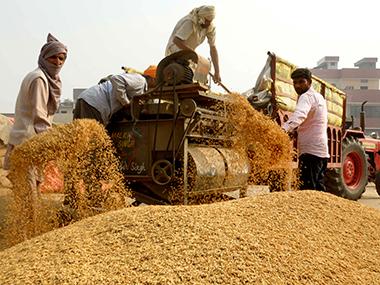By Shreerupa Mitra-Jha Giant agricultural corporations are seriously impacting the right to food of women, especially in developing countries like India by increasingly suing farmers for breaching patent laws, a UN expert said. “These big companies are suing farmers because the farmers are using (patented seeds) without the permission (from agricultural corporations) or (are not) buying the particular seeds. This is a very serious issue and millions of dollars the corporations are taking from the farmers because they (farmers) are no longer owning the seeds,” said Hilal Elver, UN special rapporteur on the right to food on Tuesday in Geneva. The UN expert said that the practice of slapping lawsuits on farmers using patented seeds without buying them from the corporations who produced it started in the US, but has now reached developing countries like India. “This is becoming an issue in developing countries, especially in India… the corporations are going and suing the farmers,” Elver added. “This is extremely important because farmers traditionally own the seeds and they were even able to make their adjustments and share with others, but now gradually international property rights in the agriculture sector are becoming common not only in developed countries, but also developing countries — which is (where) basically poor farmers are living and many of them are women,” she said. [caption id=“attachment_2664482” align=“alignleft” width=“380”] Representational image. AFP[/caption] Existing patent laws allow private companies to assert ownership over seeds — a sector that has historically been in the public sector. Elver stated in her report, on women and the right to food that she presented to the UN Human Rights Council on Monday, that agricultural research and development that was traditionally under the public sector has been taken over by private companies and the competitive market. The 10 largest agricultural biotechnology companies invest roughly €1.69 billion ($1.86 billion) a year, on new product development, amounting to about 7.5 percent of these companies’ total sales revenue, the report states. The companies recoup this money by patenting seeds also meant for poor farmers in developing countries. “The greatest implication of the IPR regime on women and their right to food relates to seed-saving — a practice that is both predominantly controlled by women and a critical component of small-scale, subsistence agriculture,” Elver told reporters. Seed-saving in India has enabled women to breed around 200,000 vareties of rice. However, now 73 percent of the world’s seed supply is patented by big corporations and is, therefore, non-renewable, turning the global commercial seed market into a multi-billion dollar industry — four companies alone account for 50 percent of this market. “With such lucrative monopolies at stake, these international corporations have actively exercised the IPR regime to secure exclusive access to, and thus royalties from, patented seeds," she said. Elver, in her report cited the instance of agricultural giant Monsanto who have since 1997 filed 147 lawsuits against US farmers who violated Monsanto’s intellectual property rights (IPR). “When farmers purchase a patented seed variety, they sign an agreement that they will not save and replant seeds produced from the seed they buy from us. More than 325,000 farmers a year buy seed under these agreements in the United States,” states the Monsanto website. Genetically-modified commodity crops of agro-companies like Monsanto and Swiss-owned Syngenta have spread fast across the world. Ninety-three percent of soybeans and 86 percent of corn crops come from such seeds in the US. However, many US farmers have sued these companies for suffering losses from sale of genetically modified crops. Monsanto has also been linked in India for the failure of genetically-modified crops thus allegedly contributing to farmer suicides though no legal action has been taken as yet. The US company has also been accused of selling so-called terminator seeds which is a biotech trait that results in second generation sterile seeds — an accusation that Monsanto has rejected. “As a result of IPR laws, seeds that would have once been saved and shared are now the intellectual property of corporations,” Elver said . Women represent 70 percent of the world’s hungry but constitute 20 to 30 percent of the 450 million agricultural workers globally. Women are accustomed to seed-saving and sharing, and would have to choose between discontinuing the traditional practice of saving and exchanging seeds or risk punishment for an intellectual property crime, Elver’s report states. International Union for Protection of New Varieties of Plant (UPOV) — an inter-governmental organization in Geneva headed by Francis Gurry who is also the secretary-general of the World Intellectual Property Organisation — will discuss the matter of patents and agricultural crops next week in Geneva. However, India is not a member of UPOV. The UN expert also called the Indian Food Security Act a “very comprehensive” act and a “model” for other developing countries to follow, also because “it gives women certain kind of leadership in their village”. “The law is very new right now but it is a very good model that other developing countries (could be) encourage(d) to go to same level of policies,” Elver told Firstpost. “And that’s an important law but they (Indian public, civil society etc) are worried about it — whether or not this law will be kept because the new Indian government seems to be trying to, little bit limit (the implementation of the law)… because they are talking about corruption, sometimes it is not enough money to help this programme, and also, the WTO rules (that) push the Indian government (to) not to subsidise these (food) in relation to international trade law principles,” she added. The writer is a journalist with the United Nations
Giant agricultural corporations are seriously impacting the right to food of women, especially in developing countries like India by increasingly suing farmers for breaching patent laws, a UN expert said
Advertisement
End of Article
Written by FP Archives
see more


)

)
)
)
)
)
)
)
)



